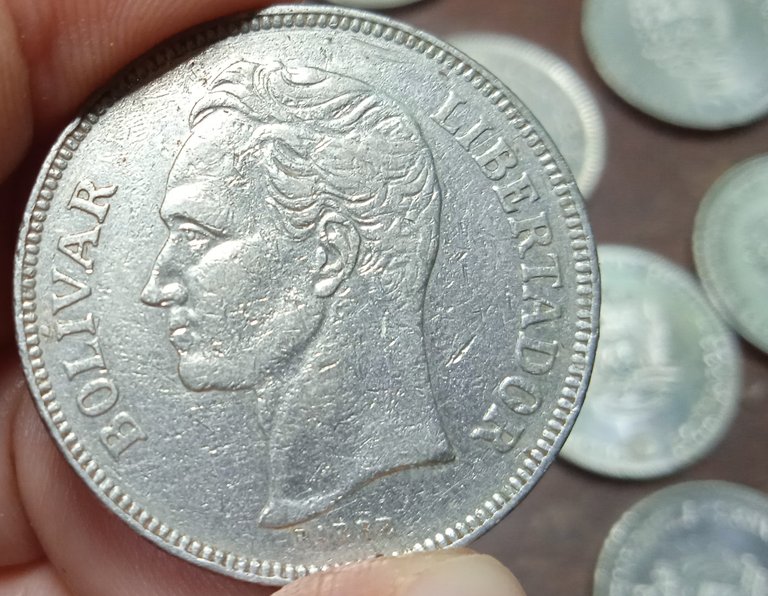
Crecí en una época en que las transacciones económicas se hacían fundamentalmente en dinero en efectivo. Soy una persona de más de 50 años, por lo que en mi temprana infancia conocí las monedas de plata, las cuales eran de uso común y legal en mi país, Venezuela. También conocí y usé monedas de menor denominación, los centavos, que eran de cobre, y otras monedas que eran un poco más valiosas que los centavos, que fueron acuñadas tanto de plata como de una aleación de cobre y níquel, conocidas como “lochas”, y otras monedas variadas de mayor denominación a las que les he nombrado, (de 0,25 céntimos o conocidas como medios; 0,50 céntimos, conocidas como “reales”, de 1 bolívar, 2 bolívares, 5 bolívares, conocidas como “fuertes”). Las monedas de plata dejaron de ser de uso común antes de que finalizara la década de los 70’s.
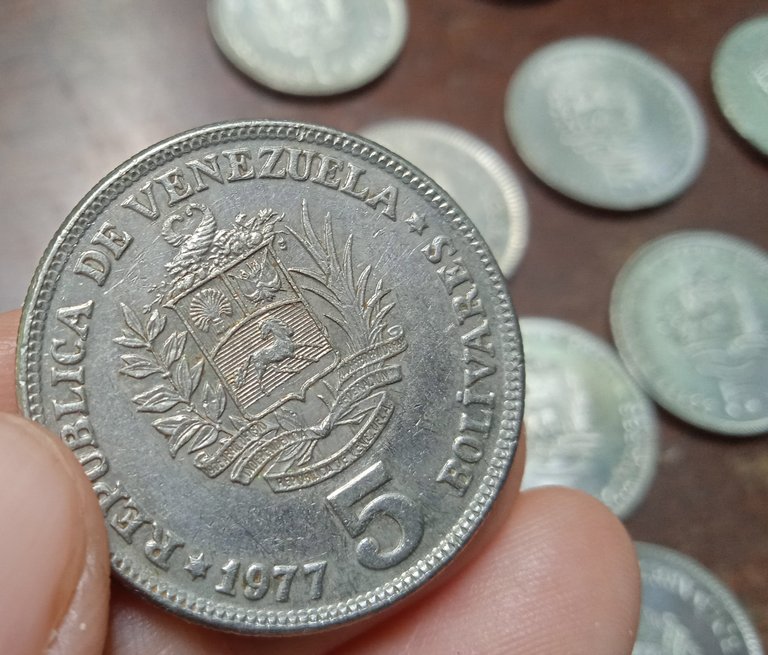

También conocí los billetes, y a lo largo de mi existencia he visto muchos conos monetarios, los cuales, antes de que el gobierno comunista entrara al poder, eran de gran calidad y hermoso diseño. Incluso, en el primer cambio del cono monetario que se hizo bajo el comunismo, los nuevos billetes mantenían su calidad y algunos presentaban hermosos diseños. Estos después cambió totalmente. Así que obviamente, conocí las alcancías, los cochinitos, y guardé dentro de alguna caja, monedas y billetes. Obviamente, en los 80’s, época en la que era una adolescente, se comenzó a masificar el uso de cheques y otros instrumentos financieros, pero el dinero en efectivo, ya fuese en monedas o en billetes, era lo que más usaba la población venezolana, e infiero que en otros países era igual, porque yo solía coleccionar las monedas extranjeras que me traía mi abuelo y mi abuela de sus viajes.
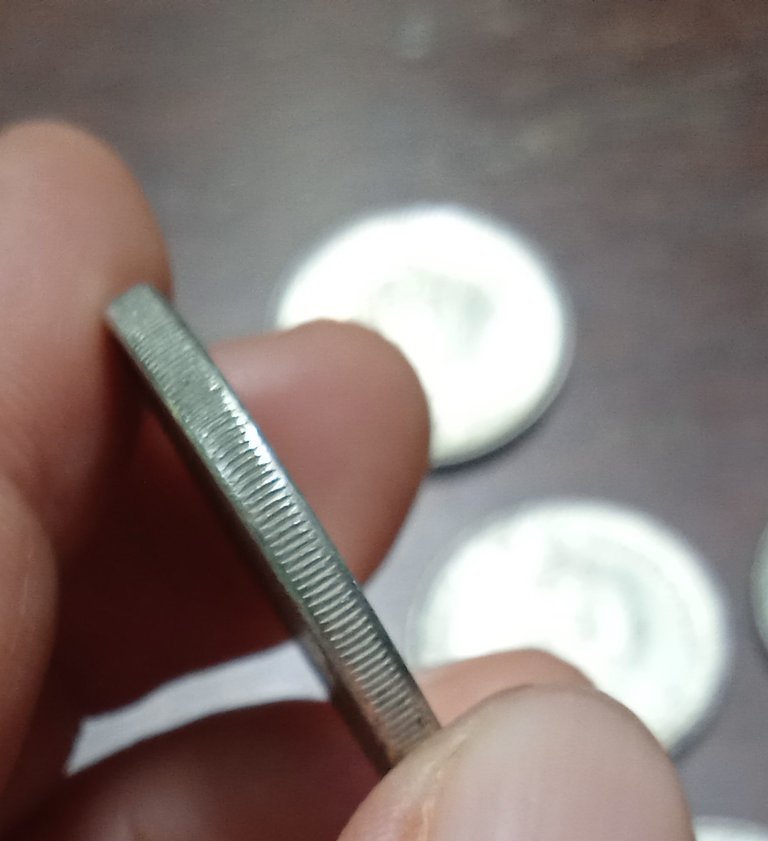

La primera vez que noté que algo tan cotidiano, práctico e importante como es el dinero en efectivo, corría el riesgo de desaparecer, fue cuando en mi país, como por arte de magia ya no se conseguían monedas, siendo sustituidas por unos billetes que parecían de juguete, parecían falsos, como de jugar Monopolio. Esto fue en el año 1988 o 1989, aproximadamente, y supuestamente fueron emitidos para paliar en ese entonces, la escasez de monedas en el país, lo cual a mi entender es incomprensible, ya que somos un país pleno de recursos minerales, especialmente de metales preciosos. Eso no me gustó ni un poquito. Tocar esos billetes pequeños, insignificantes y efímeros, me parecía como si no tuviese nada de valor en mis manos, sino un trozo de papel cualquiera. Sé que eran billetes de baja denominación, pero, aun así, en ese entonces se podía comprar algo con ellos; así que tuve la sensación como si algo se comenzara a perder, a difuminar. No sé explicar claramente ese sentimiento, pero lo recuerdo claramente. Después las monedas reaparecieron nuevamente, y todo volvió supuestamente a la normalidad. Ahora que lo pienso, es como si hubiesen hecho algún tipo de experimento social con nosotros… Esto me llevó a querer guardar más monedas, como si de algo raro y valioso se tratase, porque percibí que se extinguirían, y no me equivoqué.
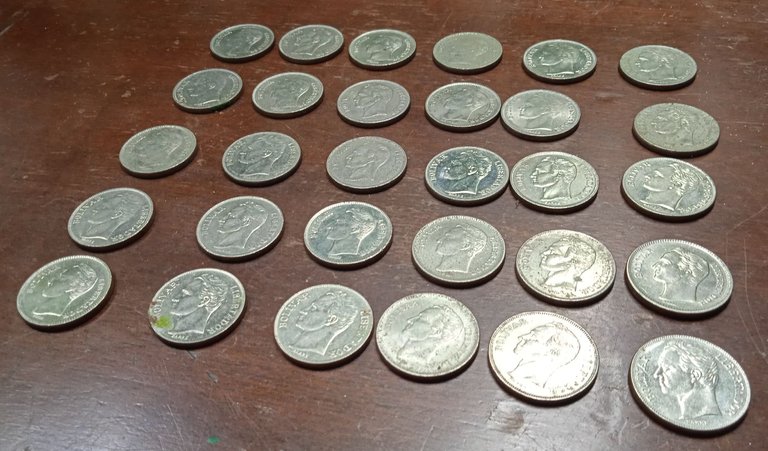

Then, with the arrival of communism, a madness of successive monetary cones began, where coins and banknotes were devalued and replaced many times by different ones, so many times that I have lost count, and I would not expose them in this post either, because I think that I It would be depressing to see more clearly the deterioration of my country's economy. I have seen with sadness, how the paper money of my country, of various monetary cones, was thrown into the trash, this is literally, piles of bills thrown into landfills or onto the streets. Some artisans rescued this paper money to make utilitarian objects, such as wallets, coasters, etc. The truth is that the bills stopped having value and the coins stopped existing and being used in my country in recent years, to the point that currently several monetary cones coexist, (if I'm wrong three cones), next to the American dollar. ; and it is with these bills that small economic transactions are made in Venezuela. To be honest, I get very involved with this, so the one who does the shopping at home is my husband.
Luego, con la llegada del comunismo comenzó una locura de sucesivos conos monetarios, en donde monedas y billetes fueron devaluados y sustituidos muchas veces por otros diferentes, tantas, que ya perdí la cuenta, y tampoco las expondría en este post, porque creo que me deprimiría de ver con mayor claridad el deterioro de la economía de mi país. He visto con tristeza, como el papel moneda de mi país, de varios conos monetarios, era tirado a la basura, esto es literal, montones de billetes lanzados a los vertederos o a las calles. Algún que otro artesano rescataba este papel moneda para hacer objetos utilitarios, como carteras, posa vasos, etc. Lo cierto es que los billetes dejaron de tener valor y las monedas dejaron de existir y de utilizarse en mi país en estos últimos años, al punto que en la actualidad coexisten varios conos monetarios, (sino me equivoco tres conos), junto al dólar americano; y con estos billetes es que se hacen las transacciones económicas pequeñas en Venezuela. Para ser franca, yo me enredo muchísimo con esto, por lo que quien hace las compras en casa es mi esposo.

Ahora bien, hago toda esta reflexión porque he visto como en Venezuela el dinero en efectivo prácticamente ha desaparecido. Las monedas no se usan, y las que aún existen es porque forman parte de alguna colección, como estas que muestro en las fotos de este post, que son de monedas de 5 bolívares, o “fuertes”. Para mí quizás esto no representa una tragedia, puesto que manejo criptos, (aprendizaje que agradezco profundamente a Hive), y obviamente estoy bancarizada. Además, las transacciones económicas en efectivo, las hace otra persona por mí. Pero yo me pongo a pensar, en aquellas personas que no están bancarizadas, que no tienen conocimiento del mundo cripto, aquellos a los que se les dificulta mucho la comprensión y manejo de los tres conos monetarios que coexisten en Venezuela (que para más INRI, son muy escasos), junto al dólar, a quienes se les hace difícil poder entender la dinámica que implica que dos veces al día, la moneda que rige los precios de todo en mi país, como es el dólar americano, sufra cambios en su valor: Uno a las 9:00 a.m. y otro a la 1:00 p.m., y esto ocurre todos los días, salvo los sábados y domingos. Estas personas son aquellas que no tienen formación, o no tienen acceso a un teléfono inteligente, a una computadora o laptop, y generalmente son personas de la tercera edad o campesinos. Y este problema se agrava aún más, cuando ha ocurrido una migración masiva, que ha dejado atrás a muchísimos ancianos, quienes quedan prácticamente solos e indefensos y son presa fácil de engaños y estafas. Para ellos, la desaparición del efectivo, sí que es una gran tragedia.
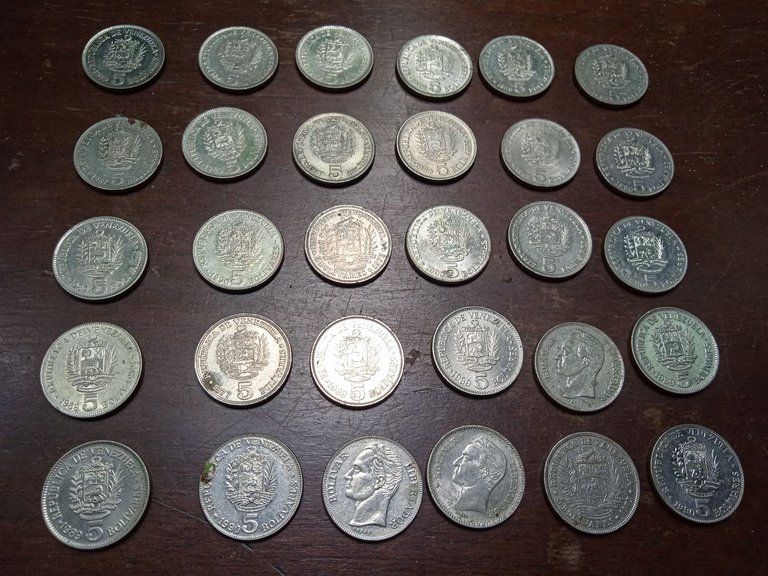

Por otra parte sé que, desde una perspectiva pragmática, el dinero es sólo metal acuñado y papel impreso, pero obviamente todos sabemos que es mucho más que eso. Es una energía, y una muy poderosa, que debe saberse manejar para que nos sea útil. Es una falsedad que el dinero es malo, ese es un dicho empobrecedor, limitante, utilizado por algunos políticos para lavarle la cabeza a las masas y manipularlas a su antojo, haciéndolas dóciles y haciéndolas sentir culpables si tienen libertad financiera y económica. El dinero es todo lo contrario, pues brinda libertad, bienestar y comodidad, claro, siempre y cuando sea bien gestionado y manejado. Pero un hecho innegable es que vivimos en una realidad física tangible, en un mundo denso, en el cual las cosas que pueden tocarse, manejarse, tenerse, hacen más comprensible y agradable la experiencia vital, además de que el poder tocar y tener algo, brinda mayor comodidad e independencia. Entonces me pongo a pensar, si esto, de la desaparición progresiva del dinero en efectivo no será otro experimento social globa. Comenzaron por Venezuela, (no sé si en otros países ya habrá ocurrido lo mismo, pero hablo desde mi experiencia personal), ¿será que logran extinguir el dinero en efectivo en todo el planeta y así tener más dominio de las masas, de la humanidad?

Aquí finalizo mi post de hoy, con esta reflexión. Y si bien creo que las criptos son importantes y muy prácticas, el dinero en efectivo también lo es. Saludos a todos

Todas las fotos de este post son de mi autoría y fueron tomadas con mi teléfono Xiomi REDMI 8 A // These photos are my own, and were taken with a Xiomi REDMI 8 A phone
Los divisores son cortesía de @eve66 quien comparte bellos diseños que embellecen el maquetado de nuestras publicaciones. // The dividers used are courtesy of @eve66 who shares beautiful designs that embellish the layout of our post.

Todo el contenido, excepto los divisores, son de mi propiedad y están sujetos a derechos de autor // All content except the dividers are my property and subject to copyrigh



Delegations welcome!

Delegations welcome!

Posted Using InLeo Alpha
It is very bizarre that once the paper money failed they didn't reintroduce silver or gold coins to at least keep the economy working. I presume it is part of American imperialism to instead use the US dollar.
Hi @mypathtofire, thank you very much for stopping by to read and comment.
I very much doubt that North American imperialism has anything to do with this situation; this is a product of the open plundering carried out and allowed by the rulers of my country and by other countries. The United States has nothing to do with it here.
When those in charge of running a country do not protect it, do not value it, do not care for it, do not honor their responsibility, and the population does not realize this, the rulers do whatever they want, and the nation and society are totally destroyed.
There is also the fact that my country is a kind of experimentation field for other policies and lines of action that will later be replicated in other nations; For example: Mexico, Spain, etc., what is happening there right now is a carbon copy of what they have previously done here.
Hugs!
Recuerdo que mi papá me contó una vez que esas monedas eran mucho más valiosas de lo que indicaba porque esas monedas tienen Niquel si mal no recuerdo, sobre todo las viejas de antes de 1990, por eso se molestó conmigo cuando agarré varias de las que tenía guardadas para comprar no recuerdo que 😅
Hola @n4nd0
¡Que bueno verte por aquí! Tu papá estaba en lo cierto, estas monedas son valiosas, bueno, creo que incluso las famosas "puyas" son valiosas por el material en que fueron acuñadas. Supe que a inicios de la migración alguna gente se llevaba esas monedas viejas, (supongo que por tierra, porque dudo que eso pueda pasarse por un aeropuerto), y las vendían en otros países, y obtenían algún dinero, muy útil cuando se está de migrante.
Igualmente el papel moneda de los billetes impresos previos a nuestro desastre, también era de gran calidad, incluso los que se imprimieron para el primer cono comentario que surgió en los dos mil.
Creo que los billetes y las monedas, el efectivo, será algo que pocas generaciones podrán conocer.
Saludos.
Sea cual sea el futuro estoy seguro que no habrá efectivo y lo no veo como algo negativo por ejemplo en China casi no se usa efectivo y me parece muy práctico
China lleva rato en eso, pero a nosotros nos lo impusieron de forma intempestiva, con un montón de circunstancias más, todas difíciles de tragar. Yo lo veo desde la perspectiva de aquellos que no están alfabetizados tecnológicamente, es triste ver a un viejito cuando no comprende muy bien las equivalencias monetarias y menos el tema de transferencias. Podría ser positivo en algunos aspectos, pero no estoy totalmente convencida de ello.
Gracias por la interacción, saludos a @zupasteleria